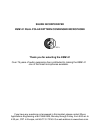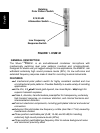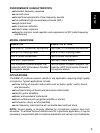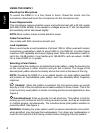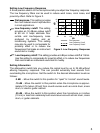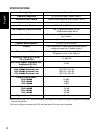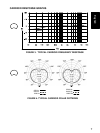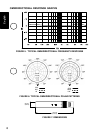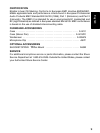
4
English
USING THE KSM141
Mounting the Microphone
To secure the KSM141 to a floor stand or boom, thread the mount onto the
microphone stand and insert the microphone into the microphone clip.
Power Requirements
This microphone requires phantom power and performs best with a 48 Vdc supply
(IEC-268-15/DIN 45 596). It can operate on voltages as low as 11 Vdc, but headroom
and sensitivity will be decreased slightly.
NOTE: Most modern mixers provide phantom power.
Cable Connections
Use a cable with XLR connectors at each end.
Load Impedance
Shure recommends a load impedance of at least 1000 Ω. When used with modern
microphone preamplifiers rated at about 2500 Ω, the KSM141 provides higher
maximum SPL capability and output clipping level. When the attenuation switch is
set to the –25 dB position, it can handle up to 164 dB SPL, and can output +15 dBV
into a load of 5000 Ω or greater.
Selecting a Polar Pattern
To select either the cardioid or omnidirectional polar pattern, rotate the knurled ring
on the microphone in either direction until you feel a detent. The image of the
desired polar pattern should be directly above the notch at the base of the ring.
NOTE: Operating the KSM141 in a non-detent position (no polar pattern selected)
will produce an unpredictable polar pattern and may adversely affect frequency
response.
Cardioid. When this pattern is selected, the microphone picks up sounds
directly in front of the microphone and is least sensitive to those in back. This is the
most commonly used pattern in studio recording and live-sound applications. See
Figure 4.
Omnidirectional. Picks up sounds from all directions. This pattern is best for
picking up room ambience and for miking several sources, such as an ensemble
or multiple singers, simultaneously. The omnidirectional polar pattern exhibits no
proximity effect. See Figure 4.
WARNING: Rotating the polar pattern switch produces mechanical noise which,
when amplified, may damage the loudspeakers. Turn down any loudspeakers or
mute the microphone at the mixing console before changing the polar pattern.




